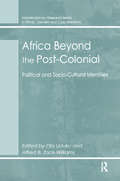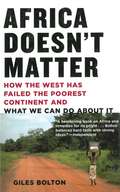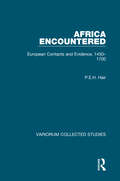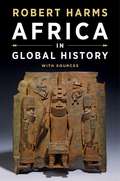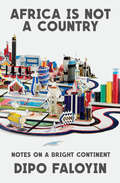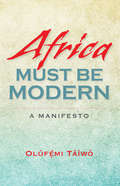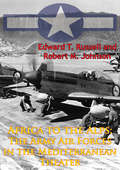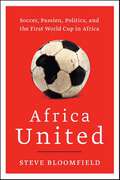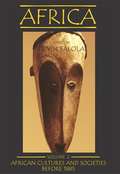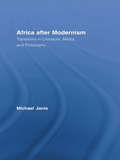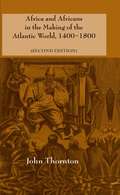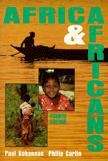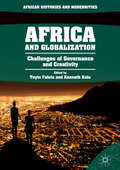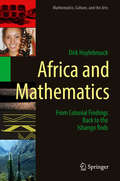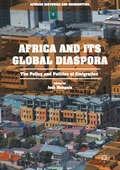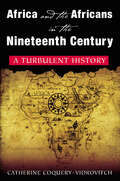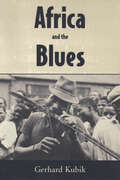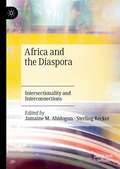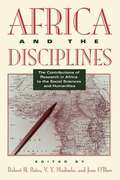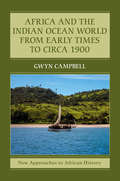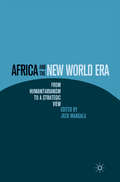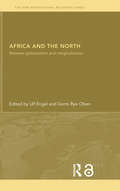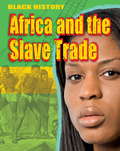- Table View
- List View
Africa Beyond the Post-Colonial: Political and Socio-Cultural Identities (Interdisciplinary Research Series in Ethnic, Gender and Class Relations)
by Alfred B. Zack-WilliamsThe poor economic performance of some African countries since independence has been a major concern to both African leaders and policy makers. This volume, which draws together contributions from academics based in Africa and its diaspora, situates the continent within its historic and socio-political background: from the 1960s, the decade of independence, through to its development outlook as the new millennium unfolds. It examines a broad range of contemporary issues -- from development and culture to linguistics and is unique in identifying and examining issues that are common both to Africa and the diaspora.
Africa Doesn't Matter: How the West Has Failed the Poorest Continent and What We Can Do About It
by Giles BoltonWhat happens to the billions of aid dollars given yearly? Why do trade rules that fail African countries also cost us at the checkout line? Why don't the African people matter? In this engaging, jargon-free, reader-friendly guide, longtime aid worker and diplomat Giles Bolton offers his radical analysis of the problems Africa faces, drawing on years of first-hand experience on the ground. Bolton illustrates how the needs of African states exceed their budgets, leaving a gap for aid to fill; how the way Western aid is delivered renders it largely ineffective; and how trade rules and globalization have worked against African development.
Africa Encountered: European Contacts and Evidence, 1450-1700 (Variorum Collected Studies)
by P.E.H. HairProfessor Hair’s aim here has been to explore the European written record for the history of Africa south of the Sahara. This effectively began with the arrival of the Portuguese on the Guinea coast and many of these articles focus on Sierra Leone; others extend the enquiry to southern Africa. One particular theme is the use of early vocabularies of African languages as a source for the history of local populations. At the same time, these studies help illuminate the European reaction to the peoples and the places they encountered.
Africa In Global History With Sources
by Robert HarmsAward-winning historian Robert Harms offers a contemporary history of Africa--one that reflects the continent's cultural richness and diversity while presenting its history in a global context. A chronological narrative covers the origins of humankind to the present, focusing on similarities and differences across regions and the continent as a whole. A stunning full-color design engages the reader with primary sources, images, and maps, and instructor resources enhance the teaching experience.
Africa Is Not a Country: Notes On A Bright Continent
by Dipo FaloyinA Literary Hub Most Anticipated Book of 2022 An exuberant, opinionated, stereotype-busting portrait of contemporary Africa in all its splendid diversity, by one of its leading new writers. So often, Africa has been depicted simplistically as a uniform land of famines and safaris, poverty and strife, stripped of all nuance. In this bold and insightful book, Dipo Faloyin offers a much-needed corrective, weaving a vibrant tapestry of stories that bring to life Africa’s rich diversity, communities, and histories. Starting with an immersive description of the lively and complex urban life of Lagos, Faloyin unearths surprising truths about many African countries’ colonial heritage and tells the story of the continent’s struggles with democracy through seven dictatorships. With biting wit, he takes on the phenomenon of the white savior complex and brings to light the damage caused by charity campaigns of the past decades, revisiting such cultural touchstones as the KONY 2012 film. Entering into the rivalries that energize the continent, Faloyin engages in the heated debate over which West African country makes the best jollof rice and describes the strange, incongruent beauty of the African Cup of Nations. With an eye toward the future promise of the continent, he explores the youth-led cultural and political movements that are defining and reimagining Africa on their own terms. The stories Faloyin shares are by turns joyful and enraging; proud and optimistic for the future even while they unequivocally confront the obstacles systematically set in place by former colonial powers. Brimming with humor and wit, filled with political insights, and, above all, infused with a deep love for the region, Africa Is Not a Country celebrates the energy and particularity of the continent’s different cultures and communities, treating Africa with the respect it deserves.
Africa Must Be Modern
by Olúfemi TáíwòIn a forthright and uncompromising manner, Olúfémi Táíwò explores Africa's hostility toward modernity and how that hostility has impeded economic development and social and political transformation. What has to change for Africa to be able to respond to the challenges of modernity and globalization? Táíwò insists that Africa can renew itself only by fully engaging with democracy and capitalism and by mining its untapped intellectual resources. While many may not agree with Táíwò's positions, they will be unable to ignore what he says. This is a bold exhortation for Africa to come into the 21st century.
Africa To The Alps: The Army Air Forces In The Mediterranean Theater [Illustrated Edition]
by Edward T. RussellIncludes over 14 photos and mapsBy the time the U.S. declared war on Germany and Italy on December 11, 1941, most of Europe had fallen under the domination of Adolf Hitler, dictator of Germany's Third Reich. In the west, only Great Britain, her armies expelled from the European continent, remained defiant; in the east, Hitler faced an implacable foe-the Soviet Union. While the Soviets tried to stave off a relentless German attack that had reached Moscow, Britain and her Commonwealth allies fought a series of crucial battles with Axis forces in North Africa.Initially, America's entry into the war changed nothing. The U.S. continued to supply the Allies with the tools of war, as it had since the passage of the Lend-Lease Act in March 1941. U.S. military forces, however, had to be expanded, trained, equipped, and deployed, all of which would take time.With the U.S. in the war, the Allies faced the question of where American forces could best be used. President Franklin D. Roosevelt and British Prime Minister Winston S. Churchill had already agreed that defeating first Germany and then Japan would be their policy, but that decision raised further questions.Roosevelt wanted U.S. troops in combat against German troops as soon as possible. Josef Stalin, the Soviet leader, demanded a second front in northern Europe to relieve pressure on his armed forces. Churchill, fearing German power in France, hoped for a strike at the Mediterranean periphery of Hitler's conquests-what he called the "soft underbelly" of Europe.Churchill proposed an invasion of northwest Africa for late 1942 and Roosevelt agreed...Africa to the Alps describes the participation of the Army Air Forces in the war in the Mediterranean theater of operations, as it developed a practical air-ground doctrine, established an effective interdiction strategy, and gained valuable experience in airborne operations and close air support of ground troops.
Africa United: Soccer, Passion, Politics, and the First World Cup in Africa
by Steve BloomfieldAfrica United is the story of modern day Africa told through its soccer. Travelling across thirteen countries, from Cairo to the Cape, Steve Bloomfield, the former Africa Correspondent for The Independent, meets players and fans, politicians and rebel leaders, discovering the role that soccer has played in shaping the continent. This wide-ranging and incisive book investigates Africa’s love of soccer, its increasing global influence, the build-up to the 2010 World Cup itself and the social and political backdrop to the greatest show on earth.
Africa Volume 2: African Cultures and Societies Before 1885
by Toyin FalolaAfrica: Volume 2 adopts a new perspective on African history and culture, surveying the wide array of societies and states that have existed on the African continent and introducing readers to the diversity of African cultural expressions.
Africa after Modernism: Transitions in Literature, Media, and Philosophy (Routledge Studies in Cultural History)
by Michael JanisAfrica after Modernism traces shifts in perspectives on African culture, arts, and philosophy from the conflict with European modernist interventions in the climate of colonialist aggression to present identitarian positions in the climate of globalism, multiculturalism, and mass media. By focusing on what may be called deconstructive moments in twentieth-century Africanist thought – on intellectual landmarks, revolutionary ideas, crises of consciousness, literary and philosophical debates – this study looks at African modernity and modernism from critical postcolonial perspectives. An effort to sketch contemporary frameworks of global intersubjective relations reflecting African cultures and concerns must resist taking modernism as a term of African periodization, or master-narrative, but as a constellation of discursive and subjective forms that obtains upon the present moment in African literature, philosophy, and cultural history. Africa after Modernism argues for a philosophical consciousness and pan-African multiculturalist ethos that operate, after the deconstruction of Eurocentrism, beyond self/other paradigms of exoticism or West/Africa political ideologies, in dialogue with postcolonial approaches to cultural reciprocity.
Africa and Africans in the Making of the Atlantic World, 1400-1800
by Edmund Burke Michael Adas Philip D. Curtin John ThorntonThis 1998 book explores Africa's involvement in the Atlantic world from the fifteenth century to the eighteenth century. It focuses especially on the causes and consequences of the slave trade, in Africa, in Europe, and in the New World. African institutions, political events, and economic structures shaped Africa's voluntary involvement in the Atlantic arena before 1680. Africa's economic and military strength gave African elites the capacity to determine how trade with Europe developed. Thornton examines the dynamics of colonization which made slaves so necessary to European colonizers, and he explains why African slaves were placed in roles of central significance. Estate structure and demography affected the capacity of slaves to form a self-sustaining society and behave as cultural actors, transferring and transforming African culture in the New World.
Africa and Africans in the making of the Atlantic world, 1400-1800
by John ThorntonThis book explores Africa's involvement in the Atlantic world from the fifteenth through the eighteenth centuries. It focuses especially on the causes and consequences of the slave trade, in Africa, in Europe, and in the New World. Prior to 1680, Africa's economic and military strength enabled African elites to determine how trade with Europe developed. Thornton examines the dynamics that made slaves so necessary to European colonizers. He explains why African slaves were placed in significant roles. Estate structure and demography affected the capacity of slaves to form a self-sustaining society and behave as cultural actors. This second edition contains a new chapter on eighteenth century developments.
Africa and Africans, 4th Edition
by Paul Bohannan Philip CurtinAfrica and Africans keeps a watchful eye on what has happened in Africa and on what has happened in the rest of the world that shapes how people look at Africa. The world's perception of Africa is an entanglement of myth and reality--both reflecting and changing with the times. This highly informative yet concise volume, written by two authors intimately familiar with Africa, presents the facts about African society--past and present. Readers wishing to explore Africa's historical events and rich traditions will discover that Africans want to keep what they value in their old way of life as they find themselves in an emerging global culture.
Africa and Globalization: Challenges Of Governance And Creativity (African Histories And Modernities #51)
by Toyin Falola Kenneth KaluOffers thoughtful, accessible analysis of how African states have responded to the challenges of globalization.<P> Presents policy recommendations for helping African states to play more active and profitable roles in the global economy.<P> Includes perspectives from a wide variety of disciplines, including political science, economics, development studies, gender studies, and film studies.<P>This book considers the promises and challenges of globalization for Africa. Why have African states been perennially unable to diversify their economies and move beyond export of primary produce, even as Southeast Asia has made a tremendous leap into manufacturing? What institutional impediments are in play in African states? What reforms would mitigate the negative effects of globalization and distribute its benefits more equitably? Covering critical themes such as political leadership, security challenges, the creative sector, and community life, essays in this volume argue that the starting point for Africa’s meaningful engagement with the rest of the world must be to look inward, examine Africa’s institutions, and work towards reforms that promote inclusiveness and stability.
Africa and Mathematics: From Colonial Findings Back to the Ishango Rods (Mathematics, Culture, and the Arts)
by Dirk HuylebrouckThis volume on ethnomathematics in Central Africa fills a gap in the current literature, focusing on a region rarely explored by other publications. It highlights the discovery of the Ishango rod, which was found to be the oldest mathematical tool in humanity's history, thereby shifting the origin of mathematics to the heart of Africa, and explores the different scientific hypotheses that emerged as a result. While it contains some high-level mathematics, the non-mathematical reader can easily skip these portions and enjoy the book’s survey of African history, culture, and art.
Africa and World War II
by Byfield, Judith A. and Brown, Carolyn A. and Parsons, Timothy and Sikainga, Ahmad Alawad Judith A. Byfield Carolyn A. Brown Timothy Parsons Ahmad Alawad SikaingaThis volume considers the military, economic, and political significance of Africa during World War II. The essays feature new research and innovative approaches to the historiography of Africa and bring to the fore issues of race, gender, and labor during the war, topics that have not yet received much critical attention. It explores the experiences of male and female combatants, peasant producers, women traders, missionaries, and sex workers. The first section offers three introductory essays that give a continent-wide overview of how Africa sustained the Allied effort through labor and resources. The six sections that follow offer individual case studies from different parts of the continent. Contributors offer a macro and micro view of the multiple levels on which Africa's contributions shaped the war as well as the ways in which the war affected individuals and communities and transformed Africa's political, economic, and social landscape.
Africa and its Global Diaspora: The Policy and Politics of Emigration (African Histories and Modernities)
by Jack MangalaThe book presents a thorough study of the changing landscape of state-diaspora relations in Africa, as well as a robust analysis of diaspora engagement policies being pursued across the continent. As the Africa diaspora strengthens its socio-economic and political clout, countries of origin in Africa have sought to engage their citizens living abroad. Over the past decade, the role of diaspora in the homeland development has become a core tenet of national strategies and policies. Against the backdrop of expanding globalization and deepening regional integration, the book presents a thorough study of the changing landscape of state-diaspora relations in Africa, as well as a robust analysis of diaspora engagement policies being pursued across the continent as states seek to extend rights to and extract obligations from their global citizens.
Africa and the Africans in the Nineteenth Century: A Turbulent History
by Mary Baker Catherine Coquery-VidrovitchMost histories seek to understand modern Africa as a troubled outcome of nineteenth century European colonialism, but that is only a small part of the story. In this celebrated book, beautifully translated from the French edition, the history of Africa in the nineteenth century unfolds from the perspective of Africans themselves rather than the European powers.It was above all a time of tremendous internal change on the African continent. Great jihads of Muslim conquest and conversion swept over West Africa. In the interior, warlords competed to control the internal slave trade. In the east, the sultanate of Zanzibar extended its reach via coastal and interior trade routes. In the north, Egypt began to modernize while Algeria was colonized. In the south, a series of forced migrations accelerated, spurred by the progression of white settlement.Through much of the century African societies assimilated and adapted to the changes generated by these diverse forces. In the end, the West's technological advantage prevailed and most of Africa fell under European control and lost its independence. Yet only by taking into account the rich complexity of this tumultuous past can we fully understand modern Africa from the colonial period to independence and the difficulties of today.
Africa and the Blues (American Made Music Series)
by Gerhard KubikIn 1969 Gerhard Kubik chanced to encounter a Mozambican labor migrant, a miner in Transvaal, South Africa, tapping a cipendani, a mouth-resonated musical bow. A comparable instrument was seen in the hands of a white Appalachian musician who claimed it as part of his own cultural heritage. Through connections like these Kubik realized that the link between these two far-flung musicians is African-American music, the sound that became the blues. Such discoveries reveal a narrative of music evolution for Kubik, a cultural anthropologist and ethnomusicologist. Traveling in Africa, Brazil, Venezuela, and the United States, he spent forty years in the field gathering the material for Africa and the Blues. In this book, Kubik relentlessly traces the remote genealogies of African cultural music through eighteen African nations, especially in the Western and Central Sudanic Belt. Included is a comprehensive map of this cradle of the blues, along with 31 photographs gathered in his fieldwork. The author also adds clear musical notations and descriptions of both African and African American traditions and practices and calls into question the many assumptions about which elements of the blues were "European" in origin and about which came from Africa. Unique to this book is Kubik's insight into the ways present-day African musicians have adopted and enlivened the blues with their own traditions. With scholarly care but with an ease for the general reader, Kubik proposes an entirely new theory on blue notes and their origins. Tracing what musical traits came from Africa and what mutations and mergers occurred in the Americas, he shows that the African American tradition we call the blues is truly a musical phenomenon belonging to the African cultural world.
Africa and the Diaspora: Intersectionality and Interconnections
by Jamaine M. Abidogun Sterling ReckerThis edited volume presents intersectionality in its various configurations and interconnections across the African continent and around the world as a concept. These chapters identify and discuss intersectionalities of identity and their interplay within precolonial, colonial, and neo-colonial constructs that develop unique and often conflicting interconnections. Scholars in this book address issues in cultural, feminist, Pan African, and postcolonial studies from interdisciplinary and traditional disciplines, including the Arts, Humanities, and Social Sciences. While Intersectionality as a framework for race, gender, and class is often applied in African-American studies, there is a dearth of work in its application to Africa and the Diaspora.This book presents a diverse set of chapters that compare, contrast, and complicate identity constructions within Africa and the Diaspora utilizing the social sciences, the arts in film and fashion, and political economies to analyze and highlight often invisible distinctions of African identity and the resulting lived experiences. These chapters provide a discussion of intersectionality’s role in understanding Africa and the Diaspora and the intricate interconnections across its people, places, history, present, and future.
Africa and the Disciplines: The Contributions of Research in Africa to the Social Sciences And Humanities
by Robert H. Bates V. Y. Mudimbe Jean F. O'BarrAfrican Studies, contrary to some accounts, is not a separate continent in the world of American higher education. Its intellectual borders touch those of economics, literature, history, philosophy and art; its history is the story of the world, both ancient and modern. This is the clear conclusion of Africa and the Disciplines, a book that addresses the question: Why should Africa be studied in the American university?
Africa and the Indian Ocean World from Early Times to Circa 1900 (New Approaches to African History #14)
by Gwyn CampbellThe history of Africa's historical relationship with the rest of the Indian Ocean world is one of a vibrant exchange that included commodities, people, flora and fauna, ideas, technologies and disease. This connection with the rest of the Indian Ocean world, a macro-region running from Eastern Africa, through the Middle East, South and Southeast Asia to East Asia, was also one heavily influenced by environmental factors. In presenting this rich and varied history, Gwyn Campbell argues that human-environment interaction, more than great men, state formation, or imperial expansion, was the central dynamic in the history of the Indian Ocean world (IOW). Environmental factors, notably the monsoon system of winds and currents, helped lay the basis for the emergence of a sophisticated and durable IOW 'global economy' around 1,500 years before the so-called European 'Voyages of Discovery'. Through his focus on human-environment interaction as the dynamic factor underpinning historical developments, Campbell radically challenges Eurocentric paradigms, and lays the foundations for a new interpretation of IOW history.
Africa and the NewWorld Era: From Humanitarianism to a Strategic View
by Jack MangalaOver the last decade, there has been a shift toward a strategic view of Africa. China and the US import much of their oil from Africa which is clearly emerging on the world stage as a strategic player. Africa and the New World Era probes the importance and significance of this shift and its implications for Africa's international relations.
Africa and the North: Between Globalization and Marginalization (New International Relations)
by Ulf Engel Gorm Rye OlsenAn important new discussion of Africa's place in the international system. This volume discusses Africa's place in the international system, examining the way in which the Westphalian system, in light of the impact of globalization and transnational networks, continues to play a major role in the structuring of Africa's international relations.The book provides a solid empirical analysis of key global players in Africa - France, the UK, the US, Japan, Germany, the EU and the UN - and of their policies towards the region. In the context of the 'war against terrorism', African political stability becomes a consideration of increasing importance. By analyzing the relevance of the states in the North, this book challenges conventional wisdom in recent international relations thinking. It applies the concept of an 'international policy community' to bridge the gap between the 'domestic' and the 'international', explaining why Africa retains a role in global politics out of any proportion to its economic weight.
Africa and the Slave Trade (Black History #1)
by Dan Lyndon-CohenUnderstand the impact of the transatlantic slave trade on Africa and on the lives of enslaved Africans. Slavery has existed in parts of the world for thousands of years. As slaves, people were traded and kept as possessions to serve their owners. It wasn't until the Transatlantic Slave Trade began that so many were enslaved and transported from one continent - Africa.The Black History series brings together a wide range of events and experiences from the past to promote knowledge and understanding of black culture today.
